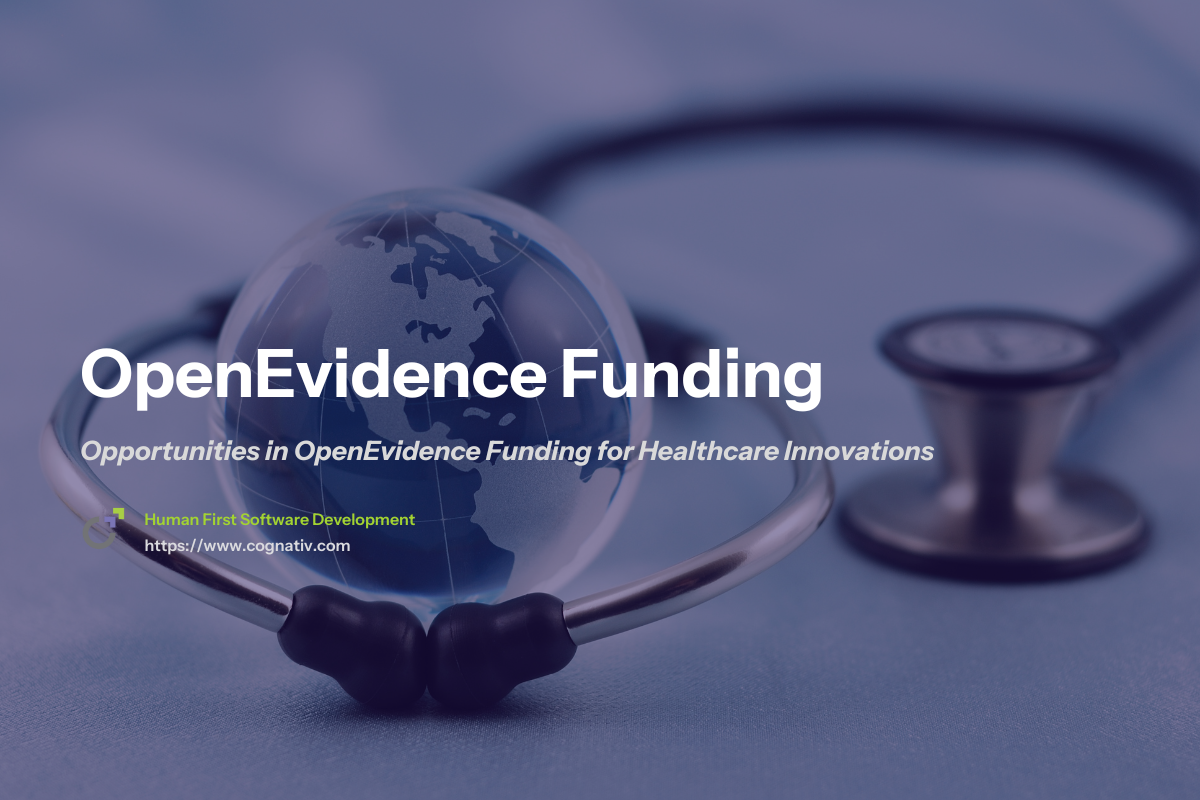Opportunities in OpenEvidence Funding for Healthcare Innovations
The $200 million openevidence funding round marks a defining moment for AI-driven healthcare innovation. With a $6 billion valuation, OpenEvidence is accelerating the adoption of AI in healthcare systems worldwide. The company is betting on artificial intelligence, machine learning, and natural language processing to transform the way physicians, nurses, and patients experience clinical care.
From improving clinical decision support to enhancing prevention strategies, this funding signals a shift toward scalable digital health solutions designed to boost efficiency, reduce administrative burden, and support better patient outcomes. It also reinforces investor confidence in specialized, vertical AI platforms built specifically for medicine.

Introduction to OpenEvidence Funding
The recent openevidence funding aims to advance innovative healthcare solutions that combine AI with proven medical practices to improve patient outcomes. A core focus lies in clinical decision support systems designed to integrate seamlessly with health systems and electronic health records (EHRs).
This funding supports development in areas such as chronic disease management, physician education, and medical knowledge enhancement through AI tools. By leveraging natural language processing, OpenEvidence can streamline care delivery and support more informed decision-making for physicians and nurses.
The larger goal is to reduce burnout, optimize time spent on patient care, and ensure that evidence-based guidelines are easily accessible in real time.

Healthcare Innovation and Artificial Intelligence
AI in healthcare is evolving beyond research labs into daily clinical workflows. Advanced ai tools enhance diagnostic accuracy, help physicians identify early symptoms, and accelerate treatment planning.
Platforms like Hippocratic AI demonstrate how ethical, evidence-based AI can complement existing medical protocols. Machine learning algorithms analyze millions of data points across health systems, including EHRs, to identify patterns and predict patient outcomes.
Generative AI adds another layer of opportunity, enabling tailored treatment plans, weight management recommendations, and more precise risk assessments. This technology gives clinicians better capabilities to act quickly and accurately.

Digital Health Market Trends
The digital health market has seen a dramatic rise in ai healthcare startup investment. Fueled by a growing need for innovation, funding rounds like the one led for OpenEvidence illustrate a broader shift toward scalable, AI-enabled care delivery models.
Prevention and personalized medicine are key themes. Millions of users and patients are benefiting from tools that enable earlier intervention and more consistent engagement. AI technology is no longer an add-on but a core component of healthcare operations.
Large language models and AI agents are also being deployed for administrative functions like scheduling, follow-up, and patient messaging. This reflects a systemic shift in how health systems approach efficiency and improving care delivery.

Research and Development in Healthcare
Research and development (R&D) remain at the heart of healthcare innovation. Funding from OpenEvidence will support a wave of new initiatives, bringing together partners from medical research institutions, private sector technology leaders, and regulatory bodies.
These collaborations aim to accelerate advancements in science, clinical applications, and specialty care. By applying AI to research, healthcare organizations can conduct more sophisticated analysis of large data sets, improving understanding of disease progression and treatment outcomes.
AI also plays a key role in drug discovery, helping teams create therapies faster and more efficiently than ever before.

Generative AI in Healthcare Applications
Generative AI is rapidly emerging as a transformative technology for clinical practice. Beyond data analysis, it can simulate disease progression, predict patient responses, and help physicians design personalized treatment plans.
For example, AI models can anticipate how cancer treatments may perform in specific patient populations or identify individuals at higher risk based on their medical history. This allows clinicians to intervene earlier and improve recovery trajectories.
However, this power comes with responsibility. Addressing data quality, model validation, and regulatory oversight is crucial to fully unlock the potential of generative AI in healthcare.

Hippocratic AI and Ethical Guardrails
Hippocratic AI is one of the leading platforms demonstrating how ethics and protected health information can coexist with innovation. Its approach emphasizes transparency, accountability, and patient confidentiality.
This ethical framework aligns closely with OpenEvidence’s own strategy. Both platforms aim to minimize algorithmic bias, ensure secure handling of sensitive patient data, and provide clinical decision support without replacing human judgment.
Regulatory alignment and ongoing review processes will be critical to maintaining trust as AI becomes further embedded in care workflows.

Clinical Applications and Outcomes of AI
The clinical use cases for AI are expanding rapidly. AI supports physicians and nurses across the care continuum — from early diagnosis to long-term treatment and recovery monitoring.
For example, AI algorithms can flag high-risk patients earlier, enabling targeted interventions. AI also enhances clinical decision support systems, improving the quality and speed of diagnosis. In addition, it improves medication management and reduces human error.
These advancements translate into better clinical outcomes, improved patient satisfaction, and more sustainable health systems overall.

Follow-up and Evaluation in Healthcare Delivery
Follow-up and evaluation are essential to effective care. AI solutions enable health systems to monitor treatment outcomes, review performance indicators, and provide personalized communication channels for patients.
By automating these workflows, hospitals can reduce no-show rates, save time spent on manual processes, and ensure ongoing engagement. This is especially valuable in chronic disease management and preventive care programs, where ongoing support drives outcomes.
These follow-up models are increasingly powered by AI-enabled EHR integrations that provide physicians and nurses with actionable insights in real time.

Collaborative Research and Development
True healthcare innovation depends on collaboration. Partners across science, clinical practice, academia, and startups are accelerating progress through shared R&D.
The latest openevidence funding wave will amplify these efforts, creating a fertile environment for joint projects targeting high-impact areas like chronic disease, mental health, and preventive medicine.
These partnerships enhance specialty expertise, enable deeper analysis, and build a stronger foundation for AI-driven healthcare solutions that address real-world clinical challenges.

Healthcare Ecosystem and Policy Alignment
The healthcare ecosystem involves multiple stakeholders: physicians, nurses, patients, payers, regulators, and federal agencies. Effective policy frameworks are essential for driving innovation in this environment.
By aligning policies with AI adoption strategies, governments and regulators can enable interoperability, protect patient privacy, and support cost-effective solutions.
Policy alignment also encourages broader adoption of technologies like clinical decision support and ai tools, making innovation more accessible across diverse care settings.

Conclusion and Future Directions
The latest openevidence funding reflects a larger story about how AI is reshaping healthcare. From early diagnostics to complex disease management, AI technologies are giving physicians and nurses the tools they need to deliver better, faster, more accurate care.
The combination of clinical intelligence, ethical frameworks, and strategic investments is fueling an era of rapid growth in digital health. Addressing challenges around privacy, validation, and regulation will be key to sustaining this momentum.
The future of healthcare will be shaped by collaboration, technology, and a relentless focus on improving care delivery.


